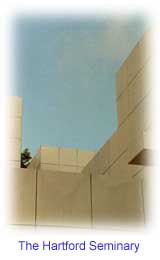
|

|

Jewish World Review / May 26, 1998 / 30 Iyar, 5758
Jonathan S. Tobin
OVER A YEAR AGO, a black man from Ghana who is a faithful Muslim sat down in
my office and told me that interfaith dialogue was only possible on the
basis of mutual respect.
"Respecting the authenticity of others," he told me
means, "We must learn to appreciate the mental furniture of each other."
It was a wise lesson.
That gentleman, Prof. Sulayman Nyang of Howard University, spent part of a
year here in Connecticut working to build bridges between faiths and teaching
about the value of interfaith dialogue. The irony is that the Hartford Seminary, one of the two institutions which combined forces to create the forum for Nyang (the other was the Maurice Greenberg Center for Judaic Studies of the University of Hartford), has now come under fire for the damage it has done to interfaith relations.
Zikmund's apology for her article, which was subsequently published in the
Courant, did little to end the dispute. She did back away from her belief
that
Jews should "let go of the idea that a Jewish state located in a physical
place is crucial to Jewish identity" which was one of the gravest of her
offenses. That's certainly a step forward, but Zikmund's letter was less
than
contrite.
It was a classic non-apology apology in which she also claimed she had been
misinterpreted and repented for the pain her article caused and not for the
body of thought it represented.
She also sought to deflect criticism with double talk such as "I also have
discovered that what one intends to write is not always what is written or
read." Whatever that is supposed to mean, I guess she's very sorry that she
is
in this pickle. And even though she's the perpetrator here, the Rev. Zikmund
has come to view herself as something of a victim.
Missing from her apology is any retraction of her analogy between the
victims
of the Nazis and the Palestinians or of her general tone in which Israelis
and
their supporters are hard-hearted victimizers of the Arabs.
For all of the havoc that her arrogant pose as sage observer of the Middle
East has caused, Barbara Brown Zikmund is not the issue here, and local Jews
should not let themselves get caught up in what happens to her.
Nor am I particular exercised over the issue of whether Jews stay on the
Seminary's Board or not. Rabbi Stephen Fuchs, a Seminary Board member and
spiritual leader of West Hartford's Congregation Beth Israel, intends to
stay
engaged with Zikmund. He is a fine man and a gentle soul whom I deeply
respect. His outreach efforts perform a useful purpose, and if he has the
patience of Job, then I suppose there are worse ways for him to expend it
than
on interaction with Rev. Zikmund.
The real issue is how Jews and non-Jews will go forward to create meaningful
dialogue in the future. And even more to the point for the Jewish community
is
the question of what have we been saying that could have given one of our
partners in dialogue the idea that she could get away with trampling on our
most cherished values.
A case in point would be the controversial magazine put out recently by the
Bennetton clothing company on behalf of the Neve Shalom peace village in
which
Palestinian Arabs and Israelis live together. The magazine entitled
"Enemies,"
garnered a lot of attention due to its cover which depicted a Jew and an
Arab
in a passionate French kiss. Though devoted to the joys of peaceful
coexistence, a major theme of the piece is that the Israelis who live there
believe Israel is in the wrong. The Arabs agree. Some dialogue. Some peace
process.
Is that the sort of dialogue that Rev. Zikmund or the Seminary (which has
disassociated itself from her article) wants? What we do need is more
dialogue
on non-Israel related issues where interfaith discussions would be
meaningful
and productive. That's what Prof. Nyang accomplished in his short tenure
here.
Yet what really worries me is that all of the tumult over the importance of
Israel within the Jewish world and the controversies over religious
pluralism,
the peace process and a host of other related issues, have caused so many
Jews
to distance themselves from Israel. In this age of "post-Zionism," it would
appear that many liberal Jews and even some others from the middle of the
spectrum, have started to assume the pose of non-Zionists or even anti-
Zionists.
There was a time before the Holocaust and the founding of Israel when such
beliefs were held by the majority of American Jews. Only the bitter lessons
of
history which showed just how right the Zionists had been about the need for
a
Jewish homeland, convinced most American Jews to see the justice and
necessity
of Zionism. Yet it would appear Rev. Zikmund was under the impression that
non-Zionism was about to stage a comeback.
Can it be that anger about how Reform and Conservative rabbis are treated in
Israel or our support of the peace process or opposition to it, has spilled
over into a perceived abandonment of Israel? Can the decline in interest in
Israel on the part of many American Jews, religious and secular, have given
the Zikmunds of the world the idea that Zionism was no longer integral to
Judaism and Jewish life? I think it is more than likely.
Why have Jewish liberals failed to challenge Christian left anti-Zionism
with
the same fervor that they go to war against the Christian right on other
issues?
And does anyone really think we would be talking about further dialogue with
someone who had said what Rev. Zikmund said, if they were a Christian
Fundamentalist or Black or Muslim instead of a culturally acceptable white
liberal?
I don't think so.
But beyond that thorny issue, it is also up to us to remember that there is
a
terrible price to be paid for the sort of Jewish disunity that has become
commonplace lately. It is sad that this only becomes clear to us when, as in
the Zikmund incident, we are attacked from the
 Hartford Seminary tangle points to bigger issues
Hartford Seminary tangle points to bigger issues

The non-apology apology
The controversy over the appalling anti-Zionist essay by Rev. Barbara Brown
Zikmund, the Seminary's president, published in the Hartford Courant on the
occasion of Israel's jubilee, is still being hashed out by that school and
the
Jewish community.
Barbara Zikmund is not the issue
But though we could spend the next year discussing Rev. Zikmund's difficulty
in backing away from her hateful article, there are more important issues at
stake here. Nor am I the least bit interested in whether she continues as
President of the Seminary, her personal path to repentence or anything else
that concerns her. As the line in "Fiddler on the Roof" goes, let her live
and
be well, "far away from us."
Mutual respect not capitulation
The key to real dialogue is the mutual respect that Prof. Nyang believes in
so
deeply. Dialogue that is predicated on one side disarming itself
unilaterally
of its beliefs so as to accommodate the other is not dialog.ue. It is
capitulation.
Have Jews sent out the wrong signals?
JWR contributor Jonathan S. Tobin is executive editor of the Connecticut Jewish Ledger.